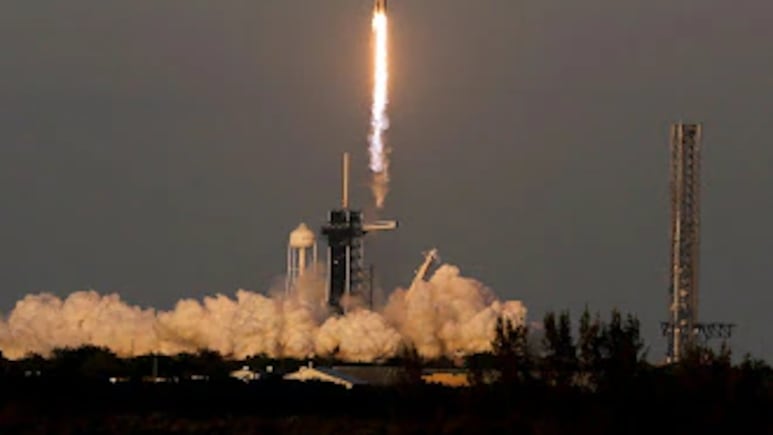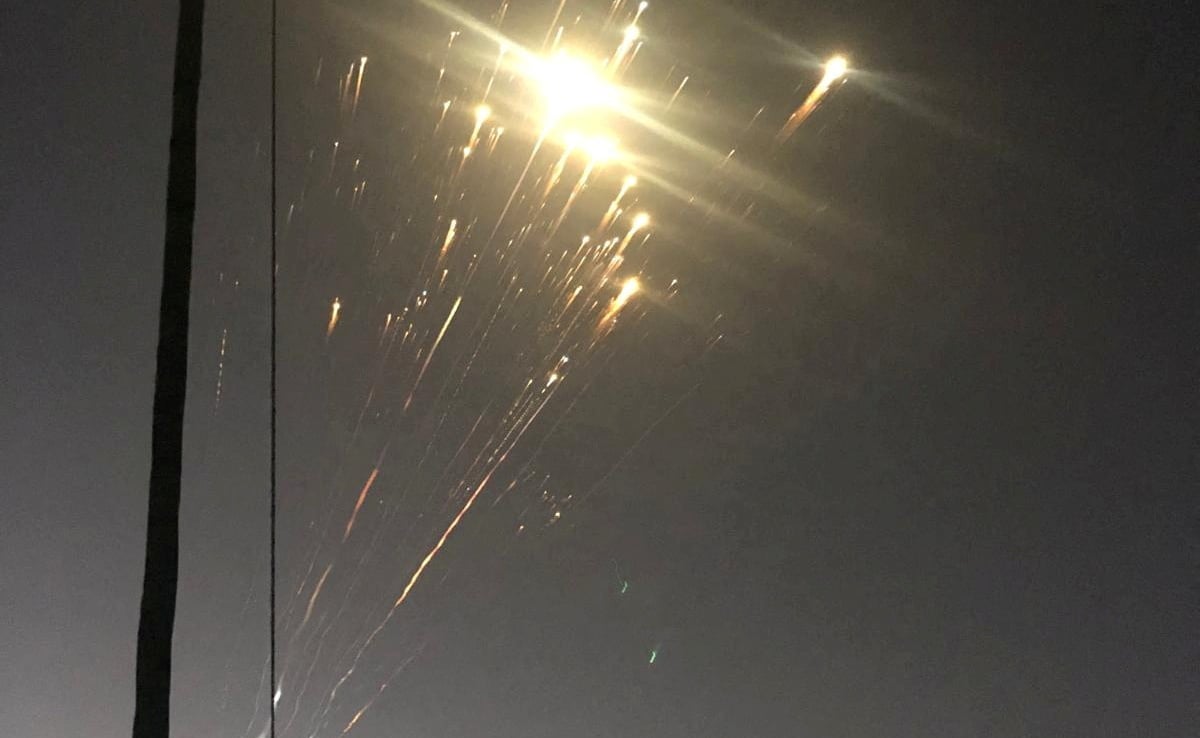
- SpaceX offered free Starlink terminals to Bahamian defence vessels for rocket booster landings
- Bahamian Deputy PM signed Falcon 9 booster landing deal without full government consultation
- Bahamian government paused the landing deal after Starship rocket explosion debris washed ashore
When SpaceX was negotiating a deal with the Bahamas last year to allow its Falcon 9 rocket boosters to land within the island nation's territory, Elon Musk's company offered a sweetener: complimentary Starlink internet terminals for the country's defense vessels, according to three people familiar with the matter.
The rocket landing deal, unlocking a more efficient path to space for SpaceX's reusable Falcon 9, was then signed in February last year by Deputy Prime Minister Chester Cooper, who bypassed consultation with several other key government ministers, one of the sources and another person familiar with the talks said.
Reuters could not determine the dollar value of the Starlink arrangement or the number of vessels outfitted with Starlink terminals. The Bahamian military, mostly a sea-faring force with a fleet of roughly a dozen vessels, did not respond to a request for comment.
Reuters found no evidence that Cooper broke any laws or regulations in striking the deal with SpaceX, but the people said the quick approval created tension within the Bahamian government.
By this April, two months after the first and only Falcon 9 booster landed off the nation's Exuma coast, the Bahamas announced it had put the landing agreement on hold. The government said publicly it wanted a post-launch investigation after the explosion in March of a different SpaceX rocket, Starship, whose mid-flight failure sent hundreds of pieces of debris washing ashore on Bahamian islands.

Photo Credit: Reuters
But the suspension was the result of the blindsided officials' frustration as well, two of the people said.
"While no toxic materials were detected and no significant environmental impact was reported, the incident prompted a reevaluation of our engagement with SpaceX," Cooper, also the country's tourism chief, told Reuters through a spokesperson.
SpaceX did not respond to questions for comment. Cooper and the prime minister's office did not respond to questions about how the rocket landing deal was arranged.
SpaceX's setbacks in the Bahamas – detailed in this story for the first time – offer a rare glimpse into its fragile diplomacy with foreign governments.
As the company races to expand its dominant space business, it must navigate the geopolitical complexities of a high-stakes, global operation involving advanced satellites and orbital-class rockets – some prone to explosive failure – flying over or near sovereign territories.
These political risks were laid bare last month when Mexican President Claudia Sheinbaum said her government was considering taking legal action against SpaceX over “contamination” related to Starship launches from Starbase, the company's rocket site in Texas, 2 miles north of the Mexican border.
Her comments came after a Starship rocket exploded into a giant fireball earlier this month on a test stand at Starbase. Responding to Sheinbaum on X, SpaceX said its teams have been hindered from recovering Starship debris that landed in Mexican territory.
SpaceX is pursuing aggressive global expansion as Musk, its CEO, has become a polarizing figure on the world stage, especially following high-profile clashes with several governments during his time advising President Donald Trump. More recently he has fallen out with Trump himself.
Starlink, SpaceX's fast-growing satellite internet venture, is a central source of revenue funding Musk's vision to send human missions to Mars aboard Starship. But to scale globally, SpaceX must continue to win the trust of foreign governments with which it wishes to operate the service, as rivals from China and companies like Jeff Bezos' Amazon ramp up competing satellite networks.
The company's talks with Bahamian officials show how Starlink is also seen as a key negotiating tool for SpaceX that can help advance other parts of its business.
According to SpaceX's orbital calculations, the Falcon 9 rocket can carry heavier payloads and more satellites to space if its booster is allowed to land in Bahamian territory. Meanwhile, Starship's trajectory from Texas to orbit requires it to pass over Caribbean airspaces, exposing the region to potential debris if the rocket fails, as it has in all three of its test flights this year.
SpaceX's deal with the Bahamas, the government said, also included a $1 million donation to the University of Bahamas, where the company pledged to conduct quarterly seminars on space and engineering topics. The company must pay a $100,000 fee per landing, pursuant to the country's space regulations it enacted in preparation for the SpaceX activities.
While SpaceX made steep investments for an agreement prone to political entanglement, the Falcon 9 booster landings could resume later this summer, two Bahamian officials said.
Holding things up is the government's examination of a SpaceX report on the booster landing's environmental impact, as well as talks among officials to amend the country's space reentry regulations to codify a better approval process and environmental review requirements, one of the sources said.
Arana Pyfrom, assistant director at the Bahamas' Department of Environmental Planning and Protection, said SpaceX's presence in the country is "polarizing". Many Bahamians, he said, have voiced concerns to the government about their safety from Starship debris and pollution to the country's waters.
"I have no strong dislike for the exploration of space, but I do have concerns about the sovereignty of my nation's airspace," Pyfrom said. "The Starship explosion just strengthened opposition to make sure we could answer all these questions."
STARSHIP FAILURES ROCK ISLANDS
Starship exploded about nine and a half minutes into flight on March 6 after launching from Texas, in what the company said was likely the result of an automatic self-destruct command triggered by an issue in its engine section. It was the second consecutive test failure after a similar mid-flight explosion in January rained debris on the Turks and Caicos Islands, a nearby British overseas territory.
Matthew Bastian, a retired engineer from Canada, was anchored in his sailboat on vacation near Ragged Island, a remote island chain in southern Bahamas, just after sunset when he witnessed Starship's explosion. What he initially thought was a rising moon quickly became an expanding fireball that turned into a "large array of streaking comets."
"My initial reaction was 'wow that is so cool,' then reality hit me – I could have a huge chunk of rocket debris crash down on me and sink my boat!" he said. "Fortunately that didn't happen, but one day it could happen to someone."
Thousands of cruise ships, ferries, workboats, fishing boats, yachts and recreational sailboats ply the waters around Caribbean islands each year, maritime traffic that is crucial for the Bahamas tourism industry.
Within days of the explosion, SpaceX dispatched staff and deployed helicopters and speedboats to swarm Ragged Island and nearby islands, using sonar to scan the seafloor for debris, four local residents and a government official told Reuters. On the surface, recovery crews hauled the wreckage from the water and transferred it onto a much larger SpaceX vessel, typically used to catch rocket fairings falling back from space, the people said.
The SpaceX team included its vice president of launch, Kiko Dontchev, who emphasized in a news conference with local reporters that the rocket is entirely different from the Falcon 9 boosters that would land off the Exuma coast under SpaceX's agreement.
Joe Darville, chairman of a local environmental organization called Save The Bays, was angered by the Starship debris, as well as what he described as a "deal done totally in secret" over the Falcon 9 agreement. As Bahamian waters become increasingly polluted and coral reefs shrink, he's unhappy with the lack of transparency in his government's dealings with SpaceX.
"Something like that should have never been made without consultation of the people in the Bahamas," he said.
Pyfrom, the official from the Bahamas' environmental agency, said the review of the SpaceX report and the approval process will show "where we fell short, and what we need to improve on."
SpaceX, meanwhile, is forging ahead with Starship. Musk said earlier this month he expects the next Starship rocket to lift off within the next three weeks.
(Except for the headline, this story has not been edited by NDTV staff and is published from a syndicated feed.)
Track Latest News Live on NDTV.com and get news updates from India and around the world

